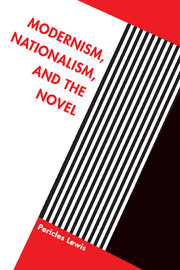Book contents
- Frontmatter
- Contents
- Acknowledgments
- Note on texts
- 1 The modern novelist as redeemer of the nation
- 2 The crisis of liberal nationalism
- 3 “His sympathies were in the right place”: Conrad and the discourse of national character
- 4 Citizens of the Plain: Proust and the discourse of national will
- 5 “Il vate nazionale”: D'Annunzio and the discourse of embodiment
- Conclusion
- Notes
- Select bibliography
- Index
Conclusion
Published online by Cambridge University Press: 22 September 2009
- Frontmatter
- Contents
- Acknowledgments
- Note on texts
- 1 The modern novelist as redeemer of the nation
- 2 The crisis of liberal nationalism
- 3 “His sympathies were in the right place”: Conrad and the discourse of national character
- 4 Citizens of the Plain: Proust and the discourse of national will
- 5 “Il vate nazionale”: D'Annunzio and the discourse of embodiment
- Conclusion
- Notes
- Select bibliography
- Index
Summary
Each of these four story-telling protagonists – Stephen Dedalus, Marlow, Proust's narrator, and d'Annunzio's nocturnal version of himself – finds an agonistic heroism in foregoing omniscience. In a “world abandoned by God,” these early modernist consciousnesses are aware of their distance from any God's-eye-view or indeed any form of objective knowledge that would be untainted by the cultural specificity and idiosyncrasy of their particular instincts, prejudices, and desires. Yet, each struggles to make of this inevitable partiality the basis for a more universal type of knowledge. The attempt to tell their stories in a language comprehensible to others but true in its representation of their experiences encounters its limits in the very fact of language itself, and this is one reason why they can share their experiences best with those who share their own language. Language is not the only force that constrains their attempts to communicate. Stephen Dedalus speaks of the “nets” of “nationality, language, religion” that constrain the Irish soul at birth (Portrait, p. 203). The method by which the modernists achieve their attempts at universality is ultimately not to “fly by those nets,” but to ponder the effects of those nets on their sympathies, their prejudices, and their very ability to speak. Their writings must embody the whole complex of national life.
- Type
- Chapter
- Information
- Modernism, Nationalism, and the Novel , pp. 210 - 216Publisher: Cambridge University PressPrint publication year: 2000
- 1
- Cited by



